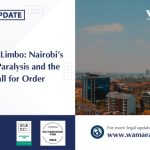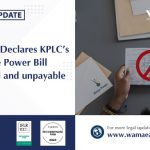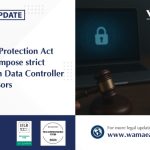Introduction
The crippling impact of the COVID-19 pandemic continues to be felt worldwide. Within a matter of weeks, the novel virus has unfortunately brought all nations including the world’s superpowers to their knees.
Undoubtedly, contractual obligations and rights created between parties prior to the pandemic have hit a snag, which begs the question, of whether these contracts have been frustrated or whether the parties to these contracts may invoke the force majeure clause in their contracts.
In this update we provide an analysis of the legal conditions that warrant frustration of contracts as well as the legal conditions that lead to invoking of a force majeure clause in the wake of the COVID-19 pandemic.
The Doctrine of Frustration
The doctrine of frustration applies in general to all types of contracts and is a common law doctrine whereby parties are excused from performing their contractual obligations if subsequent events make the contract impossible or unlawful to perform.
It is important to note that only certain events will frustrate a contract. They include the following:
- When the contract becomes impossible to This can take place if any of the following take place:
- The subject matter of the contract is destroyed – For example, in an agreement for sale of hay, the hay is accidentally burnt;
- The death of a party – For example, in an agreement for sale of a painting, the artist dies due to any cause including Covid-19;
- Incapacity – For example in an agreement for provision of service, the service provider falls ill or is imprisoned; and
- Impossible method of performance – For example, if the contract specifies the use of a certain mode of transport which subsequently becomes unavailable, such as international flights which have been grounded due to the Covid-19 pandemic, the contract becomes frustrated.
- When there are legal changes making performance of a contract illegal– Case in point, contracts made during the First and Second World Wars were frustrated by laws that outlawed trading with enemy states. In the same breath, contracts may be frustrated due to the various laws enacted worldwide in a bid to combat the COVID-19 pandemic;
- When a contract is cancelled due to an unexpected event– Case in point, due to the COVID-19 pandemic, the Tokyo 2020 Olympic Games have been postponed. Several contracts including contracts with travel agencies also remain postponed; and
- When government sanctions are imposed – depending on the nature of the action, governmental actions may frustrate the contract by legislative intervention or regulation or by other prohibitive actions. For instance, the Public Health Rules on Covid-19 and the Containment Order prohibit movement in and out of specified areas. The frustration of contracts out of governmental regulation may occur in the following forms:
- A contract for the supply of goods, for example, would be frustrated since the goods will no longer be delivered if the contracting parties are separated by the boundaries in the Containment Order;
- Contracts for the sale of land may be frustrated by the closure of land registries and;
Contracts requiring personal performance may be frustrated by the government’s quarantine and separation measures under the Public Health Act. The legal consequence of the doctrine of frustration of a contract is that it results to the termination of contractual obligations and rights. These obligations are only terminated when the contract becomes impossible to perform as was held in Taylor v Caldwell (1863) 3 B & S 826. If there is a possibility of performance, for example as a result of an ill service provider recovering or an unexpected event passing, the contractual obligations and rights may only be postponed not terminated.
Force Majeure
The Black’s Law Dictionary defines force majeure as:
“An event or effect that can be neither anticipated nor controlled. The term includes both acts of nature (e.g. floods and hurricanes) and acts of people.”
It is also defined as a specific contractual clause that specifies the circumstances under which the parties will be not be liable for their contractual obligations.
In the case of Pankaj Transport PVT Limited v SDV Transami Kenya Limited [2017] eKLR, Judge E. K. Ogola stated that:
“Force majeure may be said to have occurred when the law recognizes that without default of either party a contractual obligation has become incapable of being performed because the circumstances in which the performance is called for would render it impossible. I promised to do this but I cannot due to some irresistible unforeseeable and uncontrollable event.”
Therefore, the consequences of invoking a force majeure clause is non-performance of contractual obligations and rights.
Further, Judge E. K. Ogola also stated that the type of circumstances envisaged by the parties to qualify as force majeure should be set out, so that those circumstances may apply to limit, extend or explain the meaning of “force majeure”. This means, for example, where the contract has set pandemic as a force majeure, only then can the Covid-19 pandemic lead to non-performance of contractual obligations.
It is important to note that a force majeure clause can only be invoked if the situation in question is covered in the said clause and there is sufficient proof that indeed the situation is beyond the control of the parties and could not have been reasonably expected.
A force majeure is not an automatic excuse for non-performance of contractual obligations and rights.
Risk Management
A contract cannot contain every possible detail, otherwise, it would be voluminous. As a tool for risk management, parties can mutually agree on measures to mitigate the situation by declaring that the pandemic does not necessarily frustrate the contract or constitute a force majeure clause.
Some of the measures that contracting parties can implement are as follows: –
- Entering into new contracts
Be that as it may that a contract does not have a force majeure clause, parties can mutually agree to enter into new contracts that include a force majeure clause which preferably includes pandemics such as COVID-19. The clause can state how and when either party informs the other on the existence of the supervening event and the action to be taken in that case.
- Amending existing contracts / entering into an addendum to supplement existing terms
This involves the variation of the contractual terms and therefore subject to the usual rules of contract law. As per the Court’s decision in Matanuska Valley Farmers Cooperating Ass’n v Monaghan 188 F.2d, 9th Circuit (1951), a party has to seek the consent of the other contracting party before amending or revising the terms of the contract. One cannot unilaterally change the terms of a contract because then, a revised contract is an offer and does not bind parties unless accepted.
As such, parties to a contract can agree to have the contract amended to suit the current situation and ensure that contractual obligations are performed at such time or in such circumstances as agreed.
To this end, Section 3 (6) of the Law of Contract Act as amended by the Business Laws Amendment Act, 2020 and Section 83P of the Kenya Information and Communications Act, recognize the use of electronic signatures when executing documents. Parties can therefore execute such contracts electronically and in the event of any dispute arising, Section 106F of the Evidence Act provides a rebuttable presumption that such contract was concluded by affixing such signature.
- Incorporation by reference
Public health concerns have necessitated social distancing. The existence of electronic communication allows parties to amend or negotiate terms of their contracts by use of electronic means such as emails. The freedom of contract allows parties to amend their terms to recognize a change of circumstances or other commercial efficiency (Fender v John-Mildman [1938] AC 1).
If parties mutually agree to amend the contract through forms of communication such as emails, the change becomes part of the contract through incorporation by reference.
The email communication qualifies as a formal document under section 2 of the Interpretation and General Provisions Act. As a matter of evidence, the email communication can be adduced in court by virtue of Sections 34 and 106B of the Evidence Act if there is a dispute surrounding the contractual terms.
Thus, parties making amendments by electronic communication should also comply with the rules of contract law regarding offer, acceptance and capacity. Subsequent amendments must not be coerced by undue influence or duress.
Conclusion
The COVID-19 pandemic has created numerous challenges towards the performance of contracts leading parties to seek out solutions to cushion the imminent risk of non-performance of contractual obligations.
Contracts containing pandemics in their force majeure clauses will allow a party not to perform their obligations upon issuance of sufficient notice to the other party of the said inability to perform.
Contracts that do not contain pandemics in their force majeure clauses may lead parties to the contract in question to invoke the doctrine of frustration as defense in a legal suit stating that the performance of contract was rendered impossible due to the Covid-19 pandemic.
That notwithstanding, parties may adopt measures as pointed out above to mitigate the risks in light of the pandemic and ensure that parties perform their obligations at a future date or subject to certain conditions depending on a case to case basis.
NOTICE: This article is provided free of charge for information purposes only; it does not constitute legal advice and should not be relied on as such. No responsibility for the accuracy and/or correctness of the information and commentary as set out in the article should be held without seeking specific legal advice on the subject matter. If you have any query regarding the same, please do not hesitate to contact the following: Judy Guandaru; Virginiah Nduta; Wamuyu Mathenge or Shalma Maina at judy@wamaeallen.com; virginiah@wamaeallen.com; wamuyu@wamaeallen.com or shalma@wamaeallen.com.










